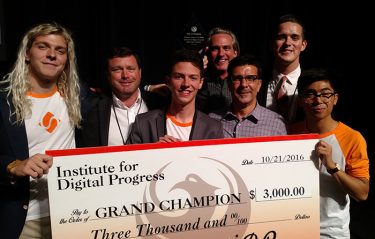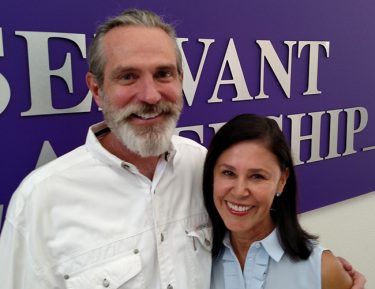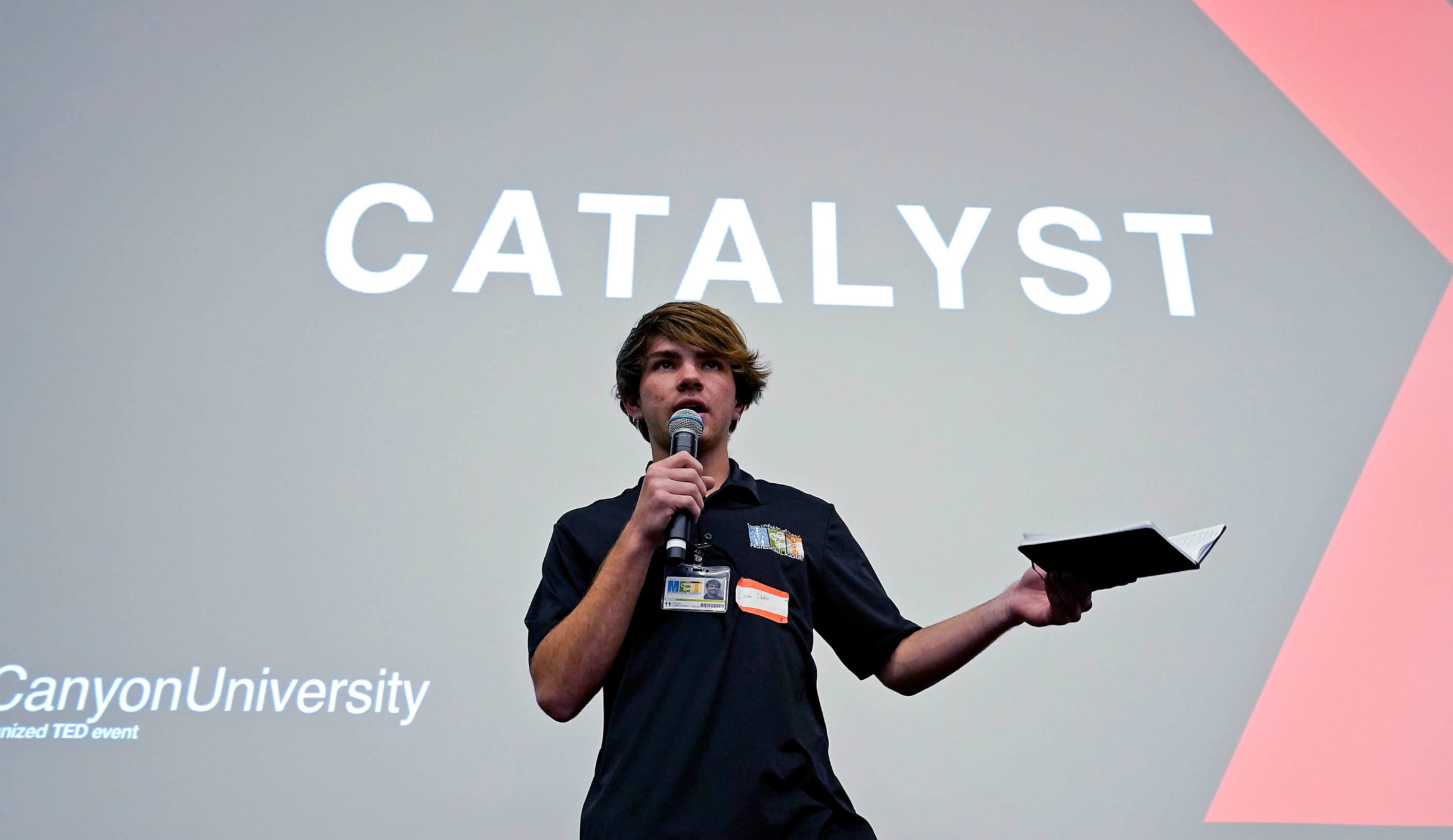By Rick Vacek
GCU News Bureau
During his 20 years as a pilot, Paul Waterman has seen an important change in how that skill is taught: Instead of going through months of studying and test-taking before taking the controls, newcomers are in the pilot seat on Day 1.
“Once someone has a passion for flying, it becomes very easy to do the learning part because now they know why they’re learning what they’re learning,” Waterman said. “And the instructor pilot very rarely will touch the controls until you’re about to kill yourself. You have to work your way into the problem and work your way out of the problem.”

Learning how to take flight in the business world isn’t nearly as dangerous, but the approach at Grand Canyon University cruises at a similar altitude. Rather than just memorizing concepts, students have to “get their learn on” – one of Waterman’s favorite sayings – to solve real-world problems.
The Colangelo College of Business instructor’s ability to disseminate complex issues into catchy phrases is only part of the reason why Waterman was named the college’s Outstanding Service faculty member for the 2016-17 academic year.
But there’s so much more to this bilingual entrepreneur who has done everything from real estate, restaurants, information technology and civil engineering to owning a water company and a Mexican law firm, he makes mere Renaissance men look like medieval mediocrity.
Here’s a closer look, headlined by some of those Watermanesque sayings:
*****
“Life is a series of projects. Learn by doing – that’s huge.”
Waterman got his award largely because of his work helping students in the Project Management Club run the TEDx event that took place in March at GCU Arena. Well, check that – his role was more like an instructor pilot, letting them fly the plane until he was needed.
“The students ran it themselves. They did most of the work,” he said. “Very seldom would I have to put my hand on the wheel.”
This is not the way it’s normally done in TED (Technology, Entertainment and Design), a nonprofit that spreads knowledge with short talks by experts on a variety of topics. Even the local version, called TEDx, usually is produced by a professional staff.
“The goal was to have our students come up with ideas for talks and then find a speaker to deliver that talk and then train that speaker to deliver that message powerfully to the audience, which would be students,” Waterman said. “It helps our students to help somebody who might be accomplished in a field.”
Another benefit: It also aligned with CCOB’s entrepreneurial mission.
“A TED talk is very similar to an entrepreneurial pitch,” he said. “You’re telling a story, leading the audience along, giving them bread crumbs, getting them to the point where, at the end, they’re interested in learning more. When entrepreneurs are making their pitches, they’re really just doing TED talks.”
Waterman said the students reported that the No. 1 subject in their subsequent job interviews was their involvement in TEDx. That alone made all the extra hours of supervision worth it.
“Sometimes it’s more work, but then they’d miss out on the learning,” he said.
*****
“I’m just a business guy.”
Right. And LeBron James is just a basketball player.

Like most other entrepreneurs, Waterman combines his natural curiosity with his can-do spirit. How did he wind up running all those businesses? He makes it sound as simple as putting one foot in front of the other.
“It happened like any entrepreneurial thing happens,” he said. “I had a need with my business. I wasn’t being served, so I figured out how to serve myself and then you realize, ‘If I’m having this problem, then other people must be having this problem also.’ You formalize it, you set up someone to run it and before you know it you have a business on your hands.”
That’s why Waterman learned how to survey land for his civil engineering company. He simply bought the equipment and learned how to use it.
“When you get out there in the world, you realize that the only thing between me and my passion or success is just getting your learn on, engaging in it, building confidence and making it happen,” he said. “I look at the trajectory of my life and all the interesting things that I’ve done, and it’s all been as a result of that – not that I went to college or was in finance or whatever it was.
“It helps to do those equations in school, but if I didn’t have a degree in finance and I wanted to learn finance today, I’d just buy the book and I’d study and figure it out. It’s not rocket science. You just have to have a passion for it and put yourself in a position where you realize what you need to know and then you figure out how to get that.”
But the journey requires something else …
*****
“Head on a swivel.”
Sneak preview for students who will be taking Waterman’s classes in the future: This question will pop up on a test.
What do I say in class all the time?
a. Head on a platter
b. Heads up
c. Head on a swivel
It’s “c.” And here’s why.
“This is not a 2 + 2 is 4,” he will tell students. “You start at zero, using the tools we talked about. You defend your crazy idea – even if I don’t like your idea, it may be the best idea in the world. For example, I thought YouTube was the stupidest idea I’d ever heard.
“I’m just an old guy. You’re the future. I can help you think about it, but you have to have the passion, you have to figure it out, and the only way you can do that is to have your head on a swivel.”
That means watching for business trends, on your own, and being proactive. Because if you’re head isn’t on a swivel …
*****
“It’s the train you don’t see that runs you over.”
Waterman noted that the 140,000 employees who used to work for Eastman Kodak sure needed to be looking around when digital camera technology started changing. The film supplier that once made “Kodak Moments” famous came out of bankruptcy four years ago and no longer markets to consumers.

“Even if you work for a large company, you have to be the CEO of your life,” he said. “If you worked for that company, it didn’t matter what your position was. If the leadership didn’t see it coming, you had to.”
He has a similar philosophy about flying, and his passion for it grew out of a brush with disaster.
While doing real estate deals across the Southwest, he was a passenger on a small plane two or three times a week. Then one day, coming out of Tucson, the alternator light came on and, as the pilot was focused on that, the engines started sputtering.
Waterman already had learned one fact about flying: When a problem seemingly appears, it is usually a distraction that ultimately causes the real crisis. He suggested to the pilot that he switch fuel tanks to send fuel to the engine from the other wing tank. The alternator had failed but was not a critical problem; fuel to the engine is. Problem solved.
“That was the day I decided I’m going to go get my license,” he said. “Then the cool thing was to be good at it – flying is not something you just kind of do.
“It was never that I wanted to feel like a bird. It was always just about competency and understanding the system and being able to manage and master that.”
He continued his studies, and practice, to earn Multi-Engine, Commercial and Instrument ratings. In recent years he and his wife, Magdalena Otailora, frequently left Phoenix in his M20R in the early morning and arrived at his parents’ home in Madison, Wis., in time for lunch.
How good a pilot is he?
“He’s the best,” Magdalena said, beaming.
Magadalena is accomplished in business as well and also has an interesting story to tell. Before arriving in the U.S., she was the CFO of one of Colombia’s largest civil engineering and construction companies, Schrader Camargo. She moved to the U.S. 22 years ago after a brief but traumatic kidnapping experience.
“She is my co-pilot in my GCU endeavor as well,” Waterman said. “My emotional and time commitment to GCU requires significant concessions from her.”
*****
Waterman is a walking quote machine who seems to toss out something interesting in every sentence. Some of his other favorites:
“Innovation is change that adds value.”
“You can study swimming from now until 50 years from now, but until you get in a pool you don’t really know if you can swim or if you really like it.”
“Pensar es gratis. No hacerlo sale carisimo.” (That’s a sign in his office. Translation: Thinking is free. Not thinking is very expensive.)
“There’s only one fastest person in the world. If you could run almost as fast as him on one leg and juggle, now you’re getting somewhere.”
That last one is another key message to students: There are lots of good candidates out there, so do something that will set you apart.
“Develop a skill set that people want,” Waterman said. “They don’t know why you’re good, they just want to work with you. Do that, and you’ve got it made. You’re not the fastest. This guy can add up to 10 faster than you can. This guy can run faster. This guy got a higher score on the CPA exam.
“There’s always someone better. There’s always someone smarter. There’s always someone faster. You have to develop those skills that allow you to be the person that people want to work with.”
The cards and emails he has gotten from CCOB students make it clear that they’re grateful for the way he has taken them under his wing. But the important thing is that he’s going to show them that, as the CEOs of our lives and futures, we all need to learn how to fly solo.
Contact Rick Vacek at (602) 639-8203 or [email protected].






















































